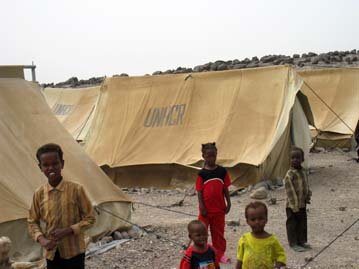Yemen’s forgotten refugee crisis
 Tim Morris (Guardian) —- Somali refugees in Sana’a are angry. Sitting on the concrete floor of a “community centre” with no facilities, they pour out grievances against the government and the UN refugee agency. “Those who come to Yemen are the unluckiest refugees in the world,” says one. “We are in an open prison. Why do they save our lives at the end of our perilous journeys only to abandon us?” The Somalis are jobless, hungry and increasingly unwelcome in the poorest Arab nation.
Tim Morris (Guardian) —- Somali refugees in Sana’a are angry. Sitting on the concrete floor of a “community centre” with no facilities, they pour out grievances against the government and the UN refugee agency. “Those who come to Yemen are the unluckiest refugees in the world,” says one. “We are in an open prison. Why do they save our lives at the end of our perilous journeys only to abandon us?” The Somalis are jobless, hungry and increasingly unwelcome in the poorest Arab nation.
Yemen – the only country in the Arabian peninsula to have signed the 1951 Refugee Convention – is powerless to stop Somalis and Ethiopians from crossing the Gulf of Aden and the Red Sea. Somalis are smuggled from Bossaso in the de facto state of Puntland and Ethiopians from Djibouti. Yemen recognises the claims of Somalis (but not Ethiopians) to refugee status.
Somalis thus report to reception centres where they are given food, water and a chance to recuperate after the two- to three-day crossing. Only a tiny minority can pay the several hundred dollars required by smuggling networks attempting to get them to Saudi Arabia. It is thought that most of those facilitating clandestine movement onward from Yemen – whether of refugees from the Horn of Africa, Yemeni migrants seeking work in Saudi Arabia or women and children trafficked for purposes of sexual exploitation or domestic labour – are Yemenis.
UNHCR believes that in 2008 more than 50,000 Somalis reached Yemen and more than a thousand died. International efforts to work with the Puntland authorities to deter smugglers seem half-hearted. Those recently displaced from Mogadishu or fleeing unprecedented drought in northern Somalia may bring this year’s total to between 80,000 and 100,000.
It is impossible to estimate the number of Ethiopians, as they are regarded as illegal migrants and hide from the authorities. Ignoring its obligations under the refugee convention, Yemen forcibly returns those who are political dissidents to uncertain fates in Addis Ababa.
Not all refugees are equal. Donors enable the UNHCR to feed and provide healthcare for Iraqi refugees in Jordan and Syria and Angelina Jolie and Brad Pitt drop in. No celebs go to Sana’a and Aden. There has been a temptation for humanitarian organisations to talk up the number of Iraqi refugees in Amman and Damascus and thus leverage more funding. In Yemen there may be an opposite tendency. The government’s estimate of 800,000 Somali refugees – and the popular view that there are half a million in Sana’a – is exaggerated. But UNHCR’s estimate of 140,000 seems implausibly low.
Their recognised refugee status means little as almost all Somalis must fend for themselves. They generally lack the contacts with diaspora communities common among Somalis in Nairobi. Very few receive funds from relatives in the west. Some live on pavements near UNHCR’s Sana’a compound.
Only the 10,000 Somalis in Yemen’s single refugee camp, al-Kharaz, regularly receive food, education and healthcare. Chronic inflation makes it increasingly difficult for urban refugees to feed themselves. It used to be common for restaurants to give Somalis leftovers. Nowadays they have competition: the UN reports one in three Yemenis are hungry. Opportunities for Somali women to work as maids have declined. The only work generally available for Somali men is car-washing. Forlorn groups of men clutching rags are seen everywhere in Sana’a.
The government asserts that no restrictions are placed on Somalis seeking employment, healthcare or education, but Somalis point to systematic violation of rights. While in theory they are entitled to receive identity cards without charge, authorities routinely solicit bribes. Many cannot afford the $15 usually demanded and in any case a card may provide only limited benefits.
Police may seize ID cards and demand bribes for their return. Somalis without ID may be held overnight and asked to pay for their stay. Even if they have ID they are now banned from using public transport and report being detained at the numerous checkpoints on Yemeni highways, asked to pay bribes, arrested or dumped at the roadside without means to return to their families. It is increasingly impossible to rent accommodation without ID.
Somalis complain of indifference whenever they try to bring complaints against employers. As Yemen’s public healthcare system collapses, it has become ever harder for Yemenis to access health professionals, and Somalis report being ignored when they report to government hospitals. They allege that when they are injured in car accidents they are given no help and that rapes and assaults remain uninvestigated. Only a quarter of school-age Somalis in Sana’a attend school.
Somalis allege that UNHCR does little to defend their rights to work and to move, to protect them from extortion or to monitor the staff of the Yemeni agencies contracted by UNHCR to help them. Almost all the Somali women struggling to hold families together in Sana’a would rather be in the refugee camp, fed and sheltered from harassment and racism. Somalis are accused of bringing HIV/Aids and street crime to Yemen and the pervasive belief that the Yemeni president receives bribes to allow Somalis to stay makes them fear for the future as street anger intensifies.
“What choices do we have?” asks one woman. “When you are hungry women must prostitute themselves and men must steal.”
UNHCR cannot allow all the Somalis into al-Kharaz. It cannot choose its own implementing partners or force the government to give it access to detained Ethiopians. The worsening internal displacement crisis along the Saudi border is further stretching the agency’s capacity.
In Yemen, UNHCR lacks the funds and the political clout to exercise its mandated role to assist and protect refugees. Yemenis are famously hospitable, but their patience is wearing thin. For all its faults, the Yemeni government has a point: if the international community ignores this refugee crisis it adds one more destabilising factor to a country at risk of becoming a failed state.
Angelina, time to fly to Sana’a?
Comments
comments
 Calendar
Calendar






































